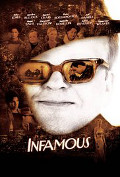
Directed by
Douglas McGrath
118 minutes
Rated M
Reviewed by
Sharon Hurst


Infamous
Synopsis: New York journalist and society darling Truman Capote (Toby Jones) decides to write a story on the gruesome murders of a Kansas farming family. With his friend Harper Lee (Sandra Bullock) he travels to Kansas where he meets investigating officer Alvin Dewey (Jeff Daniels). After an arrest is made, Truman inveigles his way into the prison where he meets accused killers Dick Hickock (Lee Pace) and Perry Smith (Daniel Craig). As his research for what he now plans as a novel gathers momentum, he forms an intense psychological bond with Perry.
One year after Phillip Seymour Hoffman garnered an Oscar for his portrayal of Truman Capote, along comes this latest offering, telling the same story again but with some significant changes. Interestingly, director McGrath, writes of his admiration for the previous film, and adds that the “tiny man” was “big enough for two pictures”. I’ll say upfront, I enjoyed this version more than the first. Which isn’t to say that Benedict Miller's Capote wasn’t a strong film but this version, the appalling crime aside, is the more entertaining. McGrath sets out to create a richer portrayal of his subject's life and times by beginning in a lighter vein in the world of Manhattan high society. The incredibly tiny, flamboyantly camp, almost feminine Truman is feted by a quartet of gossip-loving society women: Slim Keith (Hope Davis), Marella Agnelli (Isabella Rossellini), Babe Paley (Sigourney Weaver) and Diana Vreeland (Juliet Stevenson), all of whom are marvellously portrayed in their shallowness. Jaunty music adds to the sense of society life, but as the film progresses things get darker. In contrast to Miller's film this version is explicit about the homosexual attraction between Capote and Smith as well as conjecturing an explanation for the senseless murders.
The opening scene of singer Kitty Dean (an impressive cameo by Gwyneth Paltrow) is a portentous introduction; as Kitty sings Cole Porter's “What Is This Thing Called Love” she seems to break down, but then recovers her composure. Have her tears have all been an act or can’t she separate herself emotionally from her song? This seems to foreshadow what happens to Truman later in the film, as his ability to write his book is so influenced by the growing attraction and empathy he feels for Perry. The strong level of pretence that runs through all the characters’ lives, especially Truman’s, will be challenged as the film loses its lightness and becomes a dark portrayal of a man’s self-destruction.
Jones is strong as Truman, with his effete ways, and high-pitched voice, you think he must actually be the man, whereas I found PSH’s performance to be just that – a performance. Bullock is a much better actor than indicated by the many silly roles she has taken in her career, and her Harper Lee is at once both strong and sympathetic. Daniel Craig (who would play James Bond in Casino Royale later that same year), exudes ambivalence and conflict, going from cold-blooded killer, prone to sudden outbursts of violence, to almost soft, vulnerable and to be pitied. Daniels is likeably low key as the local policeman, who initially cannot fathom what makes Capote tick, yet who forms an unlikely friendship with the writer, and serves as a link between the perplexed Hicksville-style townsfolk and their fancy New York visitor.
Viewers will no doubt dispute interminably as to which film they prefer and why – and why not when both are very worthy re-tellings of one of modern literary history’s most amazing true stories.
Want something different?





